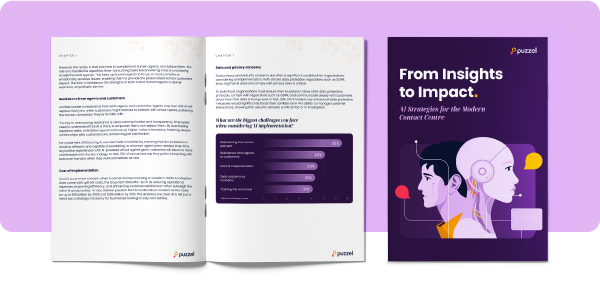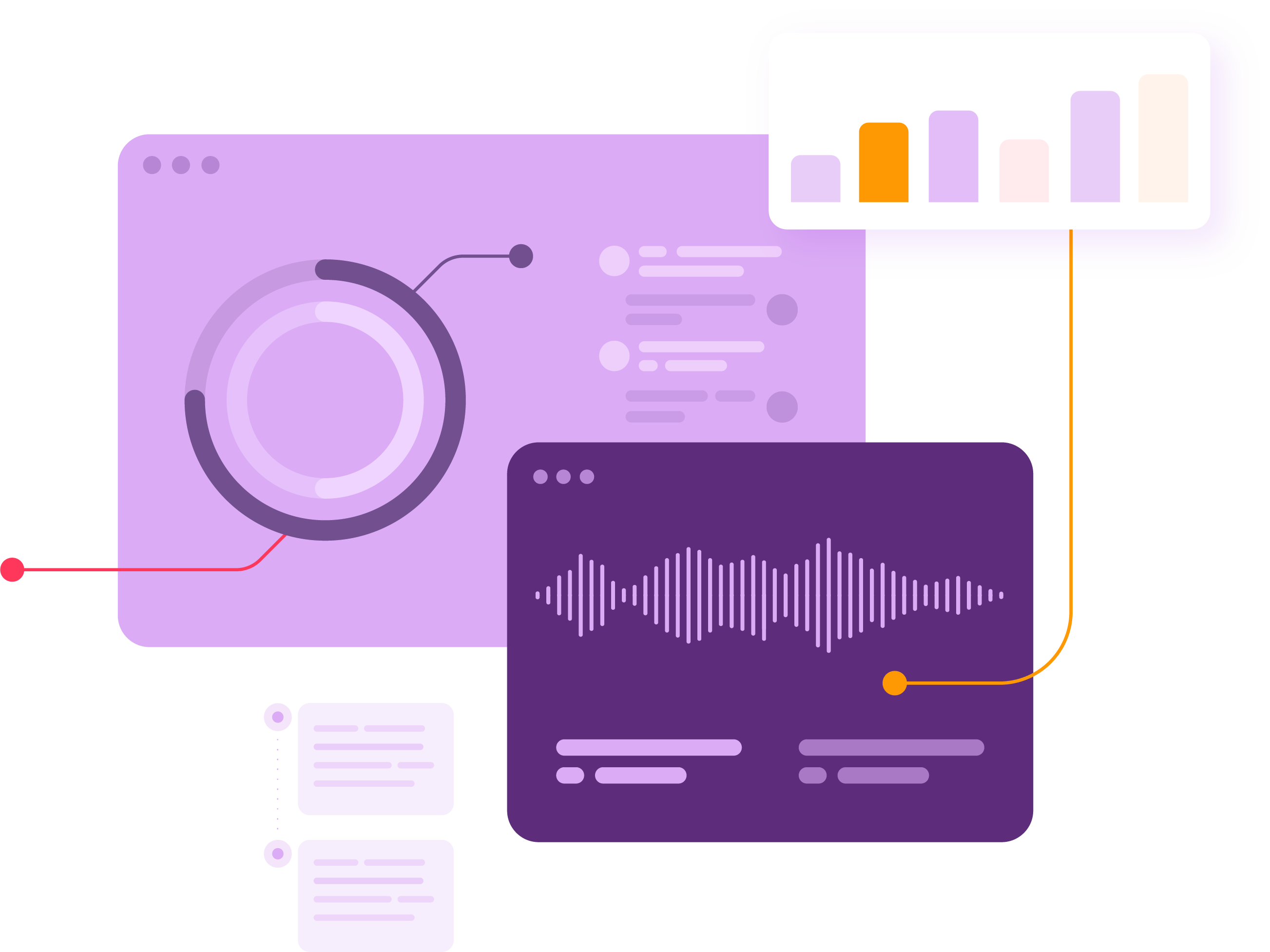Customer experience is changing fast, and contact centres are feeling the pressure to keep up. As AI continues to change the industry, CX leaders are adapting by embracing new technologies, rethinking their strategies, and discovering smarter ways to deliver faster, more personalised support. But how do you move beyond the buzz and turn AI insights into real, measurable outcomes for your team and customers?
The eBook From Insights to Impact: AI Strategies for the Modern Contact Centre explores how AI is empowering contact centres to turn potential into real results. From automating routine tasks to equipping agents with real-time insights, AI is helping teams simplify operations, boost efficiency, and create exceptional customer experiences.
This guide breaks down key AI strategies, sharing real-world examples and expert insights to help you make informed decisions. Whether you’re just starting your AI journey or looking to optimise your approach, you’ll find actionable takeaways to drive impact—while maintaining the human touch that’s at the heart of great service.
Chapter 1 — Overcoming the Challenges of AI Adoption
As with any new technology, AI adoption comes with its own set of challenges. The fear of disruption and common barriers — like resistance from agents, concerns about losing the human touch, and technical hurdles — can complicate the process.
Maintaining the Human Element
A key concern is preserving the human touch in customer interactions. With AI taking on more routine tasks, some worry that customer service will become too impersonal. Puzzel’s research shows that 33% of businesses cite this as a major challenge when considering AI adoption.
However, the reality is that AI is here to complement human agents, not replace them. AI’s role is to handle the repetitive, time-consuming tasks like answering FAQs or processing straightforward queries. This frees up human agents to focus on more complex or emotionally sensitive issues, enabling them to provide the personalised service customers expect. The trick is to balance the strengths of both AI and human agents to deliver seamless, empathetic service.
Resistance from Agents and Customers
Another barrier is resistance from both agents and customers. Agents may fear that AI will replace their jobs, while customers might hesitate to interact with virtual agents, preferring the human connection they’re familiar with.
The key to overcoming resistance is clear communication and transparency. Employees need to understand that AI is there to empower them, not replace them. By automating repetitive tasks, AI enables agents to focus on higher-value interactions — fostering deeper relationships with customers and enhancing job satisfaction.
For customers, introducing AI can be made smoother by ensuring that the AI solution is intuitive, efficient, and capable of escalating to a human agent when needed. Over time, as positive experiences with AI-powered virtual agents grow, customers will become more comfortable with the technology. In fact, 51% of consumers say they prefer interacting with bots over humans when they want immediate service.
Cost of Implementation
Cost is a common concern when it comes to implementing AI solutions. While AI adoption does come with upfront costs, the long-term benefits — such as reducing operational expenses, improving efficiency, and enhancing customer satisfaction — often outweigh the initial financial outlay.
Gartner predicts that AI could reduce contact centre costs by up to $80 billion by 2026 and $240 billion by 2031. The statistics are clear: AI is not just a trend but a strategic necessity for businesses looking to stay competitive.
Data and Privacy Concerns
Data privacy and security concerns are often a significant roadblock for organisations considering AI implementation. With stricter data protection regulations such as GDPR, ensuring that AI solutions comply with privacy laws is critical.
To build trust, organisations must ensure their AI systems follow strict data protection protocols, comply with regulations such as GDPR, and communicate clearly with customers about how their data is being used.
In fact, 28% of CX leaders say enhanced data protection measures would significantly boost their confidence in AI’s ability to manage customer interactions — showing that security remains a critical factor in AI adoption.
Top Challenges Identified in AI Implementation (Puzzel 2024 Data)
-
33% — Maintaining the human element
-
26% — Resistance from agents or customers
-
23% — Cost of implementation
-
22% — Data and privacy concerns
-
21% — Training AI models
Chapter 2: Key AI Strategies to Drive Impact in Your Contact Centre
In fast-paced contact centres, operational efficiency and customer satisfaction go hand in hand, however achieving both at scale can be tricky. AI presents an opportunity to overcome many of the traditional challenges faced by contact centres—whether it’s handling high query volumes, reducing agent burnout, or delivering personalised service across various channels.
From automating repetitive tasks to improving real-time decision-making and optimising workflows, AI offers practical solutions that help streamline operations while improving the overall customer experience. Let’s dive into how AI can transform your contact centre for the better, making it more efficient, responsive, and customer-centric.
Automating Repetitive Tasks
Manual, time-consuming tasks and high query volumes are major hurdles for contact centres. And let’s face it: spending time on repetitive, routine tasks can be daunting for your contact centre agents.
This is where AI can really shine. By using AI-powered self-service options like virtual agents and chatbots to handle repetitive tasks, your human agents are freed up to focus on the conversations that matter most.
Automating tasks like answering frequently asked questions, handling routine enquiries, and processing simple requests means you can reduce wait times and improve service efficiency. It also leads to a more satisfying experience for your agents—they’ll be able to dive into more interesting, complex issues rather than getting bogged down by routine tasks.
Example:
Puzzel’s virtual agents for chat, email and voice channels can manage common queries and tasks in seconds, 24/7, leaving your team to focus on providing exceptional service where it’s needed most.
Optimising Workflows Using AI-Powered Intelligent Routing
When it comes to contact centre efficiency, routing calls or chats to the right person at the right time can make all the difference. Intelligent routing powered by AI ensures that customer queries are directed to the most appropriate agent, based on factors like skills, availability, and even past interactions.
This intelligent system takes the guesswork out of the equation, reducing wait times and preventing customers from being passed around from one agent to another. It helps your team stay organised and focused on their areas of expertise, making the whole process more streamlined and productive.
In a busy contact centre, time is precious. With AI-powered routing, you’re not only improving operational efficiency but also boosting agent productivity and ensuring your customers get the attention they deserve — right when they need it.
Enhancing Real-Time Decision-Making with Predictive Analytics
Predictive analytics is the key to smarter, faster decision-making. By using AI to predict customer behaviour, trends, and needs, you can make immediate adjustments to your operations and improve customer outcomes.
For example, AI can help you anticipate which customers are likely to need assistance based on their past interactions or identify patterns in contact volume to better allocate resources. By understanding customer needs before they’re even asked, you’re not only increasing efficiency but also delivering a personalised experience that feels both proactive and thoughtful.
This is the power of predictive analytics: giving you the insight to make decisions in the moment, rather than reacting after the fact.
Improving CX with Personalised AI-Powered Touchpoints
Customers today want to feel heard, valued, and understood. AI can help you achieve that by providing personalised experiences across every customer touchpoint — whether it’s on the phone, in a chat, or even via email.
By using AI to track customer data, preferences, and past interactions, you can ensure that every interaction is tailored to meet individual needs. AI can instantly surface customer preferences, making interactions more human and relevant.
Personalisation extends beyond conversations — it shapes recommendations, self-service options, and predictive insights that anticipate customer needs. And because AI scales effortlessly, every customer receives personalised service, no matter how large your contact centre becomes.
Puzzel Virtual Agent Suite
Give your customers fast, tailored support with virtual agents for chat, voice, and email. Reduce resolution times, improve self-service, and provide contextual, secure answers — while empowering agents with seamless transfers for efficient resolution.
AI Chat Agent
Deploy chat agents tailored to your brand, with robust safeguards ensuring control, fast responses, and secure support.
AI Voice Agent
Instant personalised responses and smooth handovers reduce wait times and boost satisfaction.
AI Email Agent
Handle higher email volumes without compromising response quality.
Chapter 3: How AI is Changing the Agent Experience
Beyond improving customer experience, AI is transforming the agent experience too — helping agents work smarter, easing stress, and making their roles more engaging and fulfilling. Contact centre agents face rising customer expectations, increasing workloads, and emotionally demanding interactions. AI steps in to make their jobs more manageable and rewarding.
Rather than replacing agents, AI reduces repetitive tasks, offers real-time support, and improves workforce planning. When implemented correctly, AI creates a better work environment, resulting in more engaged, productive, and satisfied teams.
Let’s explore how AI improves the agent experience.
Providing Real-Time Insights for Faster, More Informed Decisions
One of AI’s most powerful benefits is providing real-time insights during customer interactions.
With instant access to customer data, interaction history, and personalised recommendations, agents can respond more accurately and efficiently.
AI tools can:
-
summarise past conversations
-
suggest appropriate responses
-
highlight key information
-
predict next best actions
This boosts agent confidence and enables them to deliver more personalised service. Agents spend less time searching for answers and more time solving meaningful problems.
Reducing Agent Stress by Automating Routine Tasks
Agent overwhelm is a serious challenge in contact centres. Repetitive tasks, high workloads, and constant pressure cause burnout.
AI reduces this burden by automating:
-
FAQs
-
simple requests
-
common workflows
-
administrative tasks
-
routine after-call work
65% of CX leaders agree AI tools reduce burnout and boost performance.
By allowing AI to handle mundane tasks (like password resets, order tracking, billing queries), agents can focus on higher-value, meaningful issues.
AI tools like real-time transcription and automated call summarisation further reduce post-interaction workload — freeing agents from time-consuming manual note-taking.
Examples of How AI Reduces Agent Stress
-
AI agents: handle repetitive tasks across chat, email, and voice
-
Response suggestions: summarise interactions and suggest replies
-
Seamless handover: AI escalates seamlessly to human agents with full context
-
Conversational analytics: reveals customer sentiment and trends
-
Workforce scheduling: forecasts demand to prevent agent overload
These capabilities lighten the mental load for agents, making their roles more satisfying.
The Bigger Picture: AI Elevates the Agent Role
AI is revolutionising the agent experience by:
-
reducing stressful tasks
-
improving access to information
-
increasing job satisfaction
-
creating opportunities for skill growth
Agents become more strategic, more effective, and more valued.
When positioned as a support tool, not a replacement, AI helps agents thrive. The result?
A more productive, happier workforce ready to deliver exceptional customer experiences.
Chapter 4: Delivering Personalised Experiences with AI at Scale
One-size-fits-all approaches no longer work. Customers expect personalised, relevant experiences that reflect their unique needs and preferences. AI makes it possible to deliver personalisation at scale by analysing customer history, behaviour, and patterns.
Whether through intelligent recommendations, dynamic content, or adaptive responses, AI allows businesses to treat every customer interaction as unique.
Research shows the importance of personalisation:
-
80% of customers are more likely to engage with brands offering personalised experiences (Qualtrics).
-
McKinsey reports personalisation can deliver up to 8x the ROI, with 10–15% revenue growth on average.
-
77% of CX leaders agree AI is crucial for delivering deeply tailored experiences.
Hyper-personalisation is no longer optional — it’s a top priority.
How AI Powers Personalisation in CX
AI is transforming how businesses personalise customer experiences. It moves organisations from reactive service to proactive, highly customised interactions.
Here are the key capabilities AI brings to personalisation:
1. Conversational Analytics
AI can analyse voice and text interactions in real time, providing insights into:
-
customer sentiment
-
behaviour
-
preferences
This helps agents adjust their tone, personalise responses, and quickly address concerns with empathy and effectiveness.
2. AI-Powered Chatbots
Unlike rule-based chatbots, AI chatbots understand context.
They can:
-
refer to previous interactions
-
offer proactive suggestions
-
recommend the next step in the customer journey
This creates a smoother, more personalised experience across channels.
3. Personalised Recommendations
Using historical interactions and behavioural patterns, AI can suggest:
-
products
-
services
-
helpful articles
-
next-step actions
Personalised recommendations boost engagement and conversion because they feel tailored and relevant to each customer.
4. Generative AI for Hyper-Personalisation
Generative AI takes tailored experiences to the next level.
It can:
-
craft personalised responses
-
generate contextual content
-
adapt messaging based on sentiment
-
produce dynamic interactions in real time
This makes customer engagement more intuitive, natural, and precise.
Managing Omnichannel Experiences with AI
AI ensures customer conversations remain consistent across channels.
It keeps track of interactions across:
-
website chat
-
email
-
voice
-
social channels
-
mobile apps
This prevents customers from repeating themselves and ensures every new interaction picks up exactly where the last one left off.
The result:
-
less friction
-
smoother transitions
-
higher satisfaction
-
a unified, coherent customer journey
AI enables continuity — a critical component of modern omnichannel CX.
Chapter 5: Building a Roadmap for AI Success in Your Contact Centre
Now that you’re familiar with the strategies AI can bring to your contact centre, it’s time to turn those ideas into action. A solid roadmap ensures your AI adoption is successful, sustainable, and aligned with your business goals.
A well-structured AI strategy not only automates key processes but also empowers agents and builds customer trust. Here’s how to turn AI from a concept into measurable impact.
Step 1: Identify the Right AI Use Cases
The first step is understanding where AI can deliver the greatest value. Not every use case will be relevant to every business.
Key questions to ask:
-
What are the most time-consuming queries that could be automated?
-
What business challenges need solving?
-
Where do customers experience the most friction?
-
How can AI help agents be more efficient?
Defining clear goals ensures you select solutions that align with your broader business strategy.
Step 2: Select the Right Tools and Solutions
Once objectives are clear, evaluate technologies and platforms that fit your contact centre’s needs.
Consider:
-
AI-powered chatbots?
-
Intelligent routing?
-
Advanced analytics?
-
Workforce optimisation?
-
Integrations with existing systems?
Also consider scalability — your AI capabilities should grow as your business grows.
Step 3: Partner with a Trusted Provider
Successful AI implementation requires more than tools — it requires expertise.
A trusted provider will:
-
understand your goals
-
guide the implementation
-
offer support and optimisation
-
bring experience with contact centre environments
They help ensure your AI initiative succeeds from planning to long-term adoption.
Step 4: Create a Phased Implementation Plan
Implementing AI doesn’t need to be overwhelming. A phased approach allows testing and optimisation without disrupting operations.
Start with a pilot in one area such as:
-
repetitive tasks
-
routing
-
self-service
-
email automation
Evaluate results, gather feedback, refine, and then expand to other areas.
Step 5: Invest in AI Training for Agents
AI adoption isn’t just a technology change — it’s a shift in how teams work.
Training should cover:
-
how AI assists interactions
-
how to interpret AI insights
-
when to escalate to a human response
-
how AI reduces workload and improves satisfaction
Well-trained teams embrace AI more confidently and effectively.
Step 6: Build Customer Trust — Balance Automation with Human Empathy
Customers still highly value human connection. Trust is key.
To build trust:
-
be transparent when AI is used
-
allow escalation to humans
-
ensure AI responses are clear and human-like
-
use AI to enhance personalisation, not replace empathy
The best implementations balance automation with human warmth.
Step 7: Track Success and Continuously Optimise
AI is not a set-and-forget solution. Continuous optimisation ensures long-term value.
Key metrics include:
-
CSAT and NPS — customer satisfaction
-
First Contact Resolution — faster answers
-
Agent efficiency and satisfaction
-
AI accuracy and relevance
Regularly refine AI models using real-world interactions.
Chapter 6: Up-skilling Agents for the AI-Driven Future
As AI becomes an integral part of contact centres, agents need the right skills to use these technologies effectively. According to Puzzel’s latest research, 29% of contact centres struggle with a lack of skilled personnel—a number that rises to 34% in larger businesses.
Training and development are essential to closing this gap.
Agents must be equipped with the knowledge and confidence to use AI tools — whether crafting effective prompts or interpreting AI suggestions to deliver more personalised service. Upskilling doesn’t just make agents more tech-savvy; it empowers them to use AI to its full potential, benefiting both the organisation and its customers.
Here’s how to support agent upskilling:
Start by Asking Your Agents
Begin by identifying skill gaps.
Use:
-
surveys
-
team workshops
-
one-on-one conversations
This reveals the areas where agents need the most support and allows training to be tailored effectively.
Make Training Hands-On and Practical
Training should be:
-
interactive
-
scenario-based
-
directly tied to real customer interactions
Workshops, simulations, and role-based exercises help agents get comfortable using AI tools in familiar contexts.
Puzzel offers training resources to help agents maximise value from their tools.
Emphasise AI as a Support Tool — Not a Replacement
It’s essential to reassure agents that AI enhances their work rather than replaces them.
Important reminders for agents:
-
AI can automate tasks, but it can’t replace human empathy
-
human creativity and problem-solving remain central
-
agents play a crucial role in complex or emotionally charged interactions
When agents feel supported instead of threatened, they’re more likely to embrace AI.
Promote Continuous Learning
AI is evolving. Skills must evolve along with it.
Encourage:
-
ongoing education
-
internal knowledge-sharing
-
continuous exploration of new AI features
-
regular refresh sessions
This builds a culture of learning and adaptability.
Encourage Collaboration Between AI and Agents
Fostering a collaborative environment helps refine AI tools and builds employee trust.
Encourage agents to:
-
give feedback on AI performance
-
report inaccuracies
-
suggest improvements
-
share best practices
This two-way dialogue helps AI tools improve while creating a sense of ownership among agents.
Why Upskilling Matters
By investing in continuous upskilling, organisations are not just preparing agents for the future. They’re empowering them to:
-
take ownership of their professional growth
-
work more efficiently with AI
-
feel confident adapting to new technologies
-
deliver higher-quality interactions
Upskilled agents are more engaged and more effective — driving better outcomes across the board.
Chapter 7: What’s Next for AI in Contact Centres?
As AI adoption accelerates across the contact centre space, one thing is clear: this is only the beginning.
The potential for AI to improve customer experiences, empower agents, and transform operations is huge — but realising this potential requires:
-
continuous learning
-
thoughtful implementation
-
a human-first approach
AI is not a quick fix or one-time project. It’s a long-term journey involving optimisation, collaboration, and experimentation. Businesses that view AI as an enabler — not just a tool — will unlock its full value.
The contact centres that thrive in the future will be those that balance:
-
automation
-
personalisation
-
human empathy
AI will increasingly:
-
support agents with real-time insights
-
simplify complex workflows
-
help deliver seamless, personalised experiences
But the human touch remains essential, especially for:
-
emotional interactions
-
creative problem-solving
-
relationship-building
To stay ahead, businesses should:
-
Continuously assess how AI improves both customer and agent experiences.
-
Prioritise trust, transparency, and fairness in AI-driven interactions.
-
Invest in ongoing training to help agents feel confident with AI tools.
-
Partner with trusted technology providers for guidance and optimisation.
-
Foster a culture of innovation and experimentation.
By treating AI adoption as a journey — with people at the heart — businesses can future-proof their operations and deliver experiences that are faster, smarter, and more human.
Set Your Contact Centre Up for Success
How Puzzel Can Help
Customer expectations are higher than ever, and Puzzel’s mission is to ensure you have the right tools to exceed them.
Conversational Intelligence
Gain deeper insights into your customers with instant, post-call analytics.
AI helps pinpoint:
-
causes of long calls
-
repeat contacts
-
churn triggers
Use these insights to take action, optimise interactions, and improve outcomes.
Boost Agent Productivity
According to the latest TEI study of Puzzel:
-
integrated channels + training delivered
-
15% boost in agent productivity
-
163% improvement in agent retention
This translated into business gains of €10.3 million over three years.
Continuous Optimisation
Puzzel works collaboratively with your team to ensure ongoing improvement.
Continuous optimisation keeps your operations running smoothly and positions your contact centre ahead of evolving customer expectations.
Virtual Agents
Take pressure off your staff by using virtual agents across:
-
chat
-
voice
-
email
These AI agents handle routine tasks and self-service needs, freeing human agents to tackle complex, high-value interactions.




